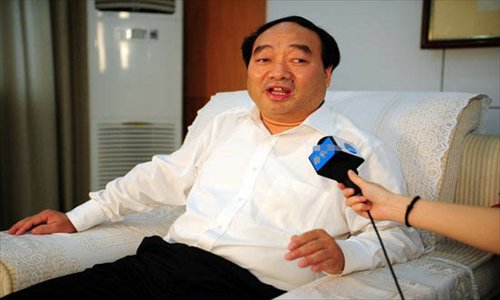Weibo justice claims official’s scalp

Citizen journalist Ji Xuguang, 32, finally returned to his home in Beijing midnight Friday. After being up all day, he was exhausted, but happy. In only three days, he had managed to get an allegedly corrupt Chongqing Party official sacked over a sex scandal.
"It only took 71 hours to fire him and it was a big victory over corruption in my journalism career," Ji told the Global Times.
Some 20 hours earlier, Ji hurried to the Beijing airport for a flight to Chongqing, where officials from the municipal commission for displinary inspection invited him to assist in a probe into the case involving Lei Zhengfu, 54, chief of the municipality's CPC Beibei District Committee.
Lei was filmed in 2007 having sex with his then 18-year-old mistress.
The tape was leaked online Tuesday, after which Lei was rapidly exposed to have handed over profitable construction deals to both his mistress and his brother.
"I was invited because of all the first-hand materials I had proved Lei's guilt, including that he was bribed with sex," Ji said, adding that he was happy to see another scalp claimed by public scrutiny.
Zhu Ruifeng, who first leaked the scandal on his Hong Kong-based website jdwsy.com Tuesday, told the Global Times this is the first time that a senior government official has been fired so quickly.
"Usually it takes at least a week. Thanks to the concerted efforts by netizens and the journalists' determination to dig out the truth, anti-corruption has been accelerating," said Zhu, a former writer for the Beijing-based Procuratorial Daily.
Crowd-sourced justice
Although Lei has been sacked, Ji still doubts if the system can fight corruption.
Zhu sent the tape to Ji after first receiving it, but it was Ji's posts on his widely read Weibo account that aroused a public storm. Given the explicitness of the material, he only posted selected screenshots on his verified Weibo Tuesday, after Zhu posted the tape on his website, which triggered a torrent of comments from netizens.
More journalists reported the case around-the-clock, especially on Weibo.
"Though some posts are destined to be deleted, many people read them first," Wang Xiaoyu, a sociologist from the Shanghai-based Tongji University, told the Global Times.
Ji said Lei denied everything and said "You and me could be friends."
"At least Lei did not threaten him or say police would arrest him, as has happened to me with officials many times," said Zhu, adding that his family often receive anonymous calls saying he is already dead.
"I have been detained and invited to 'eat lunch or drink tea' with police officers for at least five times every year after I quit the government-run journal in 2006. But I post the truth, so I'm safe," Zhu said.
Ji and his source, who provided the tape, have been threatened by anonymous calls since it was posted. "Exposing a corruption case is not easy because vested interests might be damaged," Ji said.
In September last year, he was "interrogated" in a hotel by police from Henan Province, after he revealed that a retired firefighter had kidnapped and imprisoned six women for four years in a basement dungeon.
Ji hesitated for a while after being invited.
Ji was in a newspaper for seven years so he does not believe in the government way of solving problems, but this time, he saw their sincerity in cracking down on corruption, so he accepted their invitation. He thinks the power of Weibo was the main factor that pushed them to act quickly.
But he was upset when they asked him to register with his identity card at a Chongqing hotel, fearing that he might be in danger if his name was recognized. "They had no intention of protecting me."
At that moment, Ji decided to return his own way of supervising on Weibo because the official way was not "reliable."
During the whole process, Ji kept posting updates on his Weibo account. "Many Web users criticized me for 'hype,' but the truth is that I want to protect myself. If the world is watching, they cannot just take me away."
Weibo no cure-all
Wang Yukai, professor with the Chinese Academy of Governance, said that the anti-corruption mechanism inside the government needs to be consolidated and outside powers could push it forward. "Nobody reported this five years ago, when the tape was made."
"Though it sometimes tarnishes officials' images, Weibo provides a chance for our government," said Wang.
"Under the pressure from Weibo, investigation is become stricter and punishments for corrupt officials more serious. Only making corruption truly costly can restore official credibility," Wang added.
However, Lin Zhe, an anti-corruption expert with the Party School of the Central Committee of CPC, said Weibo can't solve corruption. "People easily get emotional and most of them will not be held responsible for what they say. Loud voices on Weibo could affect the official's fair judgment."
Ji and Zhu echoed Lin.
"No matter how loud Weibo gets, we will end up needing the rule of law to punish the corrupt, in combination with a transparent supervision mechanism," Ji said.
Profiles
Ji Xuguang, 32
Ji was a reporter with the Southern Metropolis Daily from 2005 to 2012, after which he became an independent journalist.
Ji became well-known in 2010 when he revealed that another reporter was being hunted by police after exposing insider trading of a listed company. The manhunt was called off after he broke the story.
His fame spread after he exposed the kidnapping and imprisonment of six women in a basement dungeon for four years by a retired firefighter in Henan Province.
Ji now posts articles on his 163.com blog and Sina Weibo.
Zhu Ruifeng, 43
A reporter with Procuratorial Daily till 2006, after which he opened the supervisory website jdwsy.com.